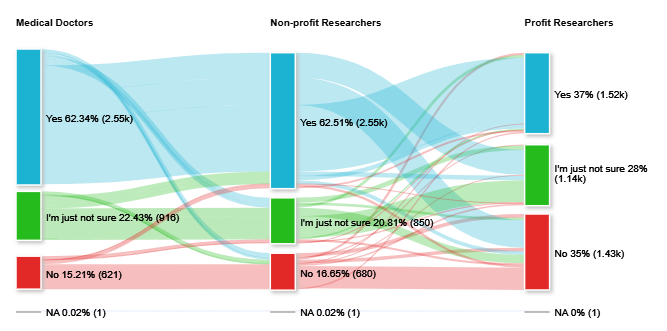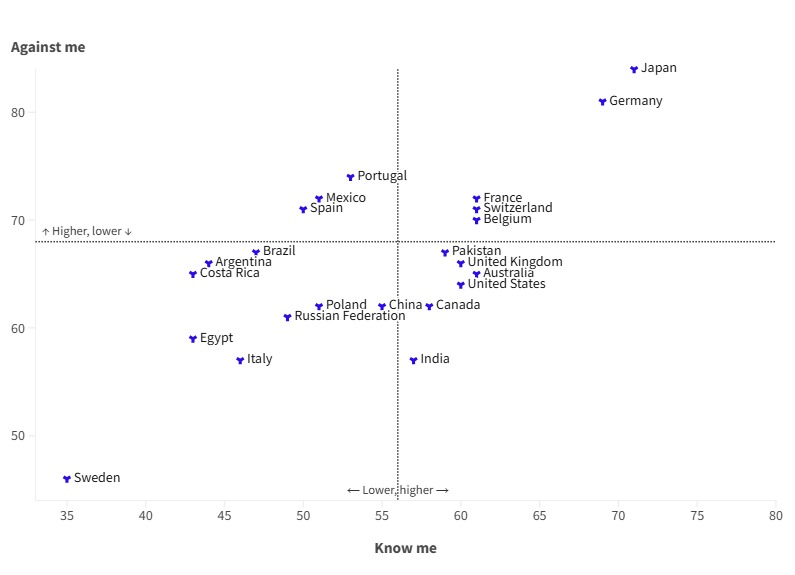About us
Learn how GA4GH helps expand responsible genomic data use to benefit human health.
Learn how GA4GH helps expand responsible genomic data use to benefit human health.
Our Strategic Road Map defines strategies, standards, and policy frameworks to support responsible global use of genomic and related health data.
Discover how a meeting of 50 leaders in genomics and medicine led to an alliance uniting more than 5,000 individuals and organisations to benefit human health.
GA4GH Inc. is a not-for-profit organisation that supports the global GA4GH community.
The GA4GH Council, consisting of the Executive Committee, Strategic Leadership Committee, and Product Steering Committee, guides our collaborative, globe-spanning alliance.
The Funders Forum brings together organisations that offer both financial support and strategic guidance.
The EDI Advisory Group responds to issues raised in the GA4GH community, finding equitable, inclusive ways to build products that benefit diverse groups.
Distributed across a number of Host Institutions, our staff team supports the mission and operations of GA4GH.
Curious who we are? Meet the people and organisations across six continents who make up GA4GH.
More than 500 organisations connected to genomics — in healthcare, research, patient advocacy, industry, and beyond — have signed onto the mission and vision of GA4GH as Organisational Members.
These core Organisational Members are genomic data initiatives that have committed resources to guide GA4GH work and pilot our products.
This subset of Organisational Members whose networks or infrastructure align with GA4GH priorities has made a long-term commitment to engaging with our community.
Local and national organisations assign experts to spend at least 30% of their time building GA4GH products.
Anyone working in genomics and related fields is invited to participate in our inclusive community by creating and using new products.
Wondering what GA4GH does? Learn how we find and overcome challenges to expanding responsible genomic data use for the benefit of human health.
Study Groups define needs. Participants survey the landscape of the genomics and health community and determine whether GA4GH can help.
Work Streams create products. Community members join together to develop technical standards, policy frameworks, and policy tools that overcome hurdles to international genomic data use.
GIF solves problems. Organisations in the forum pilot GA4GH products in real-world situations. Along the way, they troubleshoot products, suggest updates, and flag additional needs.
GIF Projects are community-led initiatives that put GA4GH products into practice in real-world scenarios.
The GIF AMA programme produces events and resources to address implementation questions and challenges.
NIF finds challenges and opportunities in genomics at a global scale. National programmes meet to share best practices, avoid incompatabilities, and help translate genomics into benefits for human health.
Communities of Interest find challenges and opportunities in areas such as rare disease, cancer, and infectious disease. Participants pinpoint real-world problems that would benefit from broad data use.
The Technical Alignment Subcommittee (TASC) supports harmonisation, interoperability, and technical alignment across GA4GH products.
Find out what’s happening with up to the minute meeting schedules for the GA4GH community.
See all our products — always free and open-source. Do you work on cloud genomics, data discovery, user access, data security or regulatory policy and ethics? Need to represent genomic, phenotypic, or clinical data? We’ve got a solution for you.
All GA4GH standards, frameworks, and tools follow the Product Development and Approval Process before being officially adopted.
Learn how other organisations have implemented GA4GH products to solve real-world problems.
Help us transform the future of genomic data use! See how GA4GH can benefit you — whether you’re using our products, writing our standards, subscribing to a newsletter, or more.
Join our community! Explore opportunities to participate in or lead GA4GH activities.
Help create new global standards and frameworks for responsible genomic data use.
Align your organisation with the GA4GH mission and vision.
Want to advance both your career and responsible genomic data sharing at the same time? See our open leadership opportunities.
Join our international team and help us advance genomic data use for the benefit of human health.
Discover current opportunities to engage with GA4GH. Share feedback on our products, apply for volunteer leadership roles, and contribute your expertise to shape the future of genomic data sharing.
Solve real problems by aligning your organisation with the world’s genomics standards. We offer software dvelopers both customisable and out-of-the-box solutions to help you get started.
Learn more about upcoming GA4GH events. See reports and recordings from our past events.
Speak directly to the global genomics and health community while supporting GA4GH strategy.
Be the first to hear about the latest GA4GH products, upcoming meetings, new initiatives, and more.
Questions? We would love to hear from you.
Read news, stories, and insights from the forefront of genomic and clinical data use.
Publishes regular briefs exploring laws and regulations, including data protection laws, that impact genomic and related health data sharing
Translates findings from studies on public attitudes towards genomic data sharing into short blog posts, with a particular focus on policy implications
Attend an upcoming GA4GH event, or view meeting reports from past events.
See new projects, updates, and calls for support from the Work Streams.
Read academic papers coauthored by GA4GH contributors.
Listen to our podcast OmicsXchange, featuring discussions from leaders in the world of genomics, health, and data sharing.
Check out our videos, then subscribe to our YouTube channel for more content.
View the latest GA4GH updates, Genomics and Health News, Implementation Notes, GDPR Briefs, and more.
20 Nov 2025
Most Latin Americans are willing to share their genetic information for non-profit goals; however, sociodemographic factors and levels of concern in case of loss of anonymity play an important role in the decision.

By Gabriela Chavaría Soley, Ronald Alfaro Redondo, and Henriette Raventós (Universidad de Costa Rica)
“Your DNA, Your Say” (YDYS) is a global survey, which explores people’s perceptions regarding medical and genetic or genomic data sharing for research purposes. Genomic research is increasingly including non-European genetic ancestry populations to enhance understanding of biological mechanisms and improve potential applications for a broader range of communities. Therefore, it is essential to examine data-sharing attitudes within these groups.
Consistent with this aim, we have analysed the responses from individuals from four Latin American countries — Argentina (N=919), Brazil (N=1349), Costa Rica (N=476), and Mexico (N=1347) — that have not been previously examined. We also developed two indexes which aggregate concerns that individuals have when sharing their medical and genetic or genomic data, and compare these between all participating countries in the YDYS survey. This blog summarises our findings of the paper Romero-Ramirez et al. (in preparation).
In general, data donation is viewed in a positive light in these four Latin American countries. Over 60% of respondents would be willing to share their medical and genomic data with their medical doctors and non-profit researchers (Figure 1). However, when the potential recipient of the information is a for-profit researcher only 37% are willing to share their data (Figure 1). This is a well-known phenomenon; willingness to donate personal data decreases when profit is involved (Cascini et al. 2024, Garrison et al. 2016, Goodman et al. 2017, Levitt et al. 2005, Mählmann et al. 2017, Milne et al. 2019, Nunes-Vilaza et al. 2021, Trinidad et al. 2010). One potential explanation is that data sharing is viewed as an altruistic act that benefits other people and science in general, and profiting from this information is seen negatively.

We explored the factors that influence a person’s decision whether to donate their personal information in these countries. We found that younger individuals, people with children, and with university education are more likely to be willing to donate their medical or genetic information for use in research. Meanwhile, country of origin, gender, religiosity, and marital status did not influence attitudes towards the sharing of personal data in our study.
In our study, we also wanted to better understand potential concerns of participants if they donated their information and their anonymity was lost. For this, we conducted a factor analysis of the list of potential concerns presented to the respondents and found the best fit grouped the items in two factors. The first was named “Know me” and includes concerns related to other people knowing information about them (Box 1). The second category was named “Against me” and includes potential consequences for participants if their private information can be linked to their name (Box 2).
Box 1. “Know me” concerns — related to other people knowing information about the participant
“My friends potentially knowing something about me that I hadn’t chosen to tell them”
“My family potentially knowing something about me that I hadn’t chosen to tell them”
“My government potentially knowing something about me that I hadn’t chosen to tell them”
“Police potentially knowing something about me that I hadn’t chosen to tell them”
“Marketing companies targeting me to sell me products”
Box 2. “Against me” concerns-related to potential consequences for the person
“Being stigmatised and labelled in some way online”
“Being cloned”, “My DNA being copied and then planted at the scene of a crime”
“Health or life insurance companies using the information to discriminate against me”
“Employers using the information to discriminate against me”
“Upsetting my genetic relatives (because my DNA information is similar to theirs)”
Using these two groups of concerns, we created two indexes called “Know Me” and “Against me”. In both cases, we use a scale from 0 to 100 points, in which higher numbers mean higher levels of concern. Since the responses for the YDYS survey are publicly available, we calculated both indexes for all participating countries. As can be seen in Figure 2, participants from Japan and Germany have the highest levels of concern if anonymity is lost. Meanwhile, in Sweden, levels of concern are very low. Intermediate levels of concern can be seen in the four Latin American countries in our study. These two concern indexes help us understand the decision-making process faced by participants when asked to donate their genetic information. The particular concerns which are most important to an individual are probably influenced by historical, social, and cultural reasons.

In summary, a person’s attitude towards genetic or genomic data sharing is shaped by multiple factors, including potential recipients, education level, age, and concerns, among others. The question of how the public views sharing of genetic information is highly relevant to participation in and outcome of biomedical research. The proposed indexes can provide researchers with a stronger understanding of the concerns that influence individuals’ disposition to donate their data. With this information, researchers can design strategies to ease fears of those who are less willing to participate, encourage participation from historically underrepresented populations in genetic research, and build a foundation of trust.
—
Cascini, F., Pantovic, A., Al-Ajlouni, Y. A., Puleo, V., De Maio, L., & Ricciardi, W. Health data sharing attitudes towards primary and secondary use of data: a systematic review. EClinicalMedicine, 71, 102551. (2024).
Garrison NA, Sathe NA, Antommaria AHM et al. A systematic literature review of individuals’ perspectives on broad consent and data sharing in the United States. Genet. Med. 18(7), 663–671 (2016).
Goodman D, Johnson CO, Bowen D, Smith M, Wenzel L, Edwards K. De-identified genomic data sharing: the research participant perspective. J. Community Genet. 8(3), 173–181 (2017).
Levitt DM, Weldon S. A well placed trust?: public perceptions of the governance of DNA databases. Critical Public Health 15(4), 311–321 (2005).
Mählmann L, Schee Gen Halfmann S, von Wyl A, Brand A. Attitudes towards personal genomics and sharing of genetic data among older swiss adults: a qualitative study. Public Health Genomics 20(5), 293–306 (2017).
Milne R, Morley KI, Howard H et al. Trust in genomic data sharing among members of the general public in the UK, USA, Canada and Australia. Hum. Genet. 138(11–12), 1237–1246 (2019).
Nunes Vilaza G, Coyle D, Bardram J. Public Attitudes to Digital Health Research Repositories: Cross-sectional International Survey. Journal Of Medical Internet Research. 23 (10): e31294. (2023).
Trinidad SB, Fullerton SM, Bares JM, Jarvik GP, Larson EB, Burke W. Genomic research and wide data sharing: views of prospective participants. Genet. Med. 12(8), 486–495 (2010).